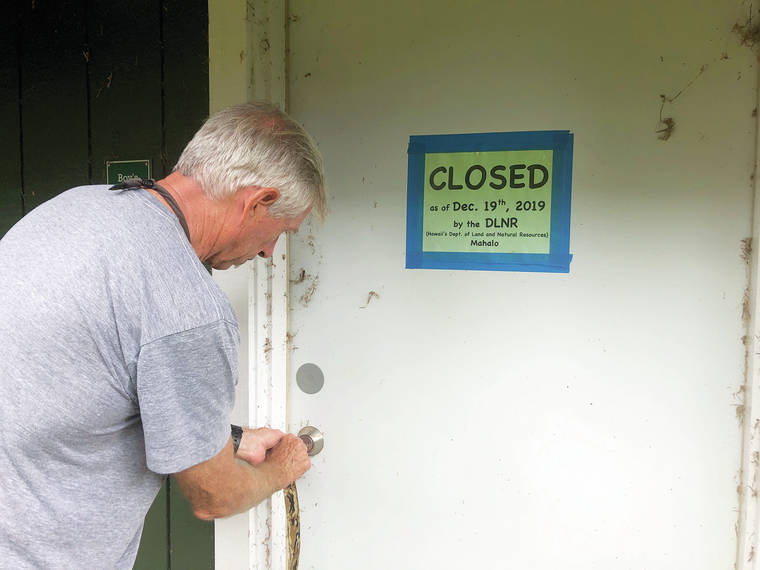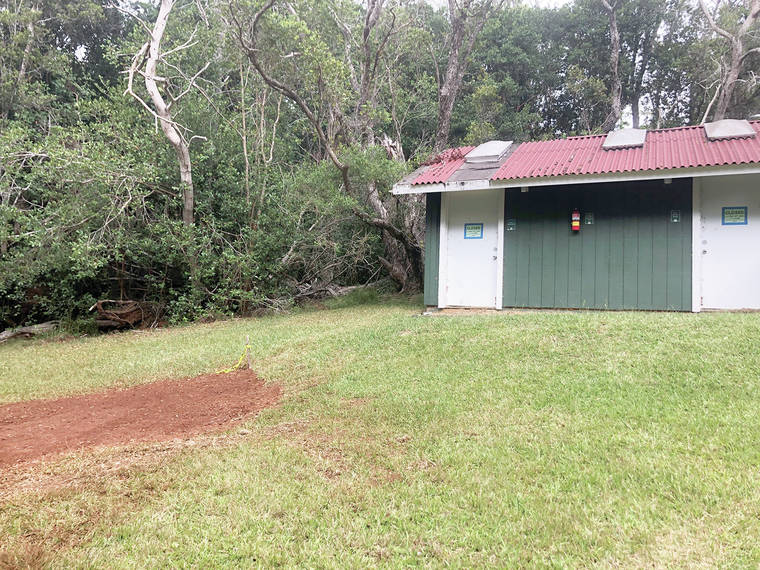Cesspool concerns shutter Camp Hale Koa

Sabrina Bodon / The Garden Island
The Rev. Rick Bundschuh, executive director of the nonprofit Camp Hale Koa Association and pastor of the Kaua‘i Christian Fellowship in Po‘ipu, stands at the camp in Waimea Canyon State Park.

Sabrina Bodon / The Garden Island
The Rev. Rick Bundschuh, executive director of the nonprofit Camp Hale Koa Association and pastor of the Kaua‘i Christian Fellowship in Po‘ipu, tries to open a closed bathroom on the camp’s property in Waimea Canyon State Park.

Sabrina Bodon / The Garden Island
At left is the filled-in cesspool at Camp Hale Koa in Waimea Canyon State Park.
KOKE‘E — After a decade of rehabilitating and leasing a four-acre campsite, the Camp Hale Koa Association is in limbo.
KOKE‘E — After a decade of rehabilitating and leasing a four-acre campsite, the Camp Hale Koa Association is in limbo.
The camp located in Waimea Canyon State Park has been shuttered since October 2019, shut down due to the illegal operation of a state-owned, large-capacity cesspool, which the Camp Hale Koa Association had no knowledge needed to be converted.
The U.S. Environmental Protection Agency required the closure and replacement of existing large-capacity cesspools in 2005, under the Safe Drinking Water Act.
During a walk-through of the property in 2019, the EPA flagged the cesspools, said the Rev. Rick Bundschuh, executive director of the nonprofit Camp Hale Koa Association and pastor of Kaua’i Christian Fellowship in Po‘ipu. That year, the state Department of Land and Natural Resources, from which CHKA is leasing the property, shut down the camp.
Bundschuh said the camp was not informed of the existence of the cesspool nor conversions prior to taking a 10-year lease from DLNR in 2015. Had they known about the cesspool and potential fines, Bundschuh said CHKA might not have taken the property on in the first place over a decade ago in 2011 under a year-to-year, revocable lease.
Cesspools, which collect raw, untreated sewage, are the primary method for disposal of sewage within Waimea Canyon and Koke‘e state parks.
There are cesspools on all leased cabin lots, according to a 2015 report from DLNR, including at the NASA facility and the Air Force facility. Private systems have been developed at other camping sites, according to the DLNR report.
For Camp Hale Koa, the cost would be around $300,000 to install a new septic system.
The exact amount of fines that the state could be facing is unclear. The EPA does not comment on pending litigation, and DLNR did not respond to questions posed.
Hearing that the camp was closed, a donor came forward to CHKA, offering to pay for the work, but it’s conditioned on the state extending CHKA’s lease. The nonprofit has not had any correspondence from DLNR since September 2020.
Keeping Camp Hale Koa affordable
Over the years, with the help of community members, Camp Hale Koa Association has turned the abandoned set of eight cabins, main hall, kitchen and caretaker cabin into an affordable camping experience for locals.
Bundschuh had been coming to the camp since 1984. He guesses it may have been kept as a medical barracks at one time, as evidenced by medicine bottles found on the site.
It cost about $30,000 to refurbish and furnish each cabins, much of the materials to restore the camp forming from grants and gifts.
“We had crews of local volunteers, weekends after weekends. I don’t know that you could count the hours,” CHKA board member Sarah Hill said. “A lot of locals in the community came and invested their time here.”
Hill has been running student ministries on the North Shore for over 18 years, often bringing kids of all ages to assist in the renovations.
“I’d bring troves of students up on the weekend,” Hill said. “They’d get to cleaning up the property, picking up trash, painting cabins and working on the main hall.”
The privacy and seclusion of the site without the internet allow for deeper, personal connections without distractions, Hill said.
“Some of the kids return to crazy atmospheres, so we encourage them to hold tight the things that they got up here,” Hill said. “It’s like they’re taken out of the comfort zones of this world and put into a place where they have to admire and enjoy the wilderness. They just get real. It’s really amazing, heavy talks.”
Part of CHKA’s goal is to make that experience affordable, Bundschuh said. Average rates are about $420 a night for any group of under 35. That’s about $12 per camper, with a 35-person minimum.
“We don’t want it to be turned into something that just weeds out the local people,” Hill said.
Adding portable toilets to the facilities in lieu of a septic system would cost about $650, which on top of a weekend night at the camp, a weekend would be about $1,000, Bundschuh said.
CHKA submits options to DLNR
Camp Hale Koa Association was initially given a year-to-year, revocable permit lease prior to a 10-year lease that was signed in 2015 for the 4.06 acres of land, with an annual rent of $480.
In supporting documents for the application, DLNR acknowledges CHKA’s work done to the property.
“Staff has visited the toured the camp and confirm the association has done a good job in restoring the camp as well as to provide the community with an affordable group-camping environment which services their targeted groups of religious, youth and families,” the April 24, 2015 application states.
CHKA recently extended two options for DLNR regarding the current situation.
The first option suggests that DLNR pay to install the septic tank and allow the camp to have a new, 10-year lease at $5,000 per year as a way to help the state pay for the cost. This 10-year lease would start once the current lease has expired.
The second option would require CHKA to borrow $300,000 to pay for the septic system, but requests the state enter into a 30-year lease at $1,000 a year so that the association could make monthly payments on the loan.
“With a 30-year lease, I am very confident that we will find the funds,” said Joe McEvoy, CKHA treasurer, in a letter. “My goal is to receive grant money to cover 50% of the cost and borrow the balance on a 30-year loan,” he said.
“I personally would use my home as collateral if needed because I believe in what Camp Hale Koa is trying to do for Kaua‘i in making affordable lodging available to everyone.”
Having a long-term lease with the state would allow the group to recoup the money and fulfill its mission, Bundschuh said.
Kaua‘i state Rep. Dee Morikawa wrote to the DLNR about a year after the closure, in September 2020.
“CHK had no knowledge of the state’s pre-existing violation of the EPA’s LCC (large-capacity cesspool) regulations. There were no verbal communications or written documents, the lease included, that notified CHK of probable EPA fines and the closure of the LCC. The state was not in compliance with EPA regulations at the time of the lease and the lease did not transfer the state’s burden to CHK,” Morikawa wrote.
This month, Morikawa recognized the position both the camp and the state are in, facing tight finances in the wake of the ongoing coronavirus pandemic.
“Our economy is in bad shape, and usage of the facility will be drastically low in the future,” Morikawa said. “I hope that the department will work with Camp Hale Koa to come to some agreement to the conversion of the cesspool to a septic system because it will be very difficult for the state to do the conversions themselves.”
All the cesspools on the property were filled-in by the end of last year by DLNR, Bundschuh said.
Hearing crickets from DLNR has been disheartening for CHKA, with the camp continuing to look for answers, he said.
“If they would have disclosed (the fines) to us, then we would have known what we were getting into,” Bundschuh said.
This story was updated Monday, Jan. 25 to provide clarity.

